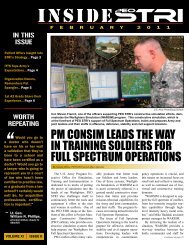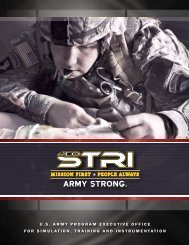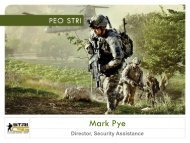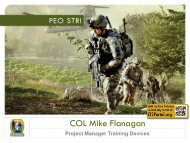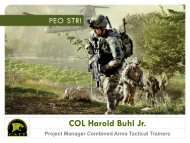InsideSTRI Jan-March 2013 - PEO STRI - U.S. Army
InsideSTRI Jan-March 2013 - PEO STRI - U.S. Army
InsideSTRI Jan-March 2013 - PEO STRI - U.S. Army
Create successful ePaper yourself
Turn your PDF publications into a flip-book with our unique Google optimized e-Paper software.
Game-based Simulator Prepares Soldiers<br />
for Culturally Sensitive Meetings<br />
By Rick Gregory, Business Operations Office Support Staff<br />
Imagine going to a meeting set up on your<br />
Microsoft Outlook calendar and you are told to<br />
abide by a list of meeting parameters.<br />
“Arrive on time, but expect to wait.”<br />
“Speak only when spoken to and do not<br />
discuss anything specific until refreshments<br />
and small talk have been offered.”<br />
“Be sure to inquire as to how things are going<br />
in the lives of the attendees.”<br />
“Do not shake hands with attendees of the<br />
opposite gender.”<br />
“Once a relationship is established at the<br />
meeting, expect same-gender hugs or even<br />
three kisses.”<br />
Those meeting parameters are probably<br />
enough to cause most people to keep their<br />
Outlook “Out of Office” message active.<br />
They are actually just a small part of the<br />
cultural awareness that <strong>Army</strong> officers have<br />
to become acutely aware of when conducting<br />
negotiation meetings with tribal leaders in<br />
Afghanistan. One seemingly insignificant breach<br />
of the cultural etiquette during the meetings can<br />
send the negotiations into a tailspin and set the<br />
much-needed bilateral cooperation on a reverse<br />
course. Negotiation skills are critical to <strong>Army</strong><br />
officers in Afghanistan as they spend hours with<br />
tribal leaders sipping tea while they discuss a<br />
range of issues that, when handled properly, can<br />
be even more effective in the war efforts than<br />
engaging the enemy in combat.<br />
As pointed out in a USA Today article titled,<br />
“The <strong>Army</strong>’s secret weapon: negotiation,” an<br />
alliance between local tribal leaders and the U.S.<br />
military helped drive Al Qaeda from Ramadi,<br />
Iraq in 2006. It was a turning point in the war.<br />
While in-class training is available to<br />
help prepare Soldiers who may be faced with<br />
negotiation tasks on upcoming deployments,<br />
<strong>PEO</strong> <strong>STRI</strong> fields a game-based computer<br />
simulation called the Bilateral Negotiation<br />
Trainer (BiLAT) that provides users a practice<br />
environment for conducting bilateral meetings<br />
and negotiations in a cultural context.<br />
Leslie Dubow, <strong>PEO</strong> <strong>STRI</strong>’s project director<br />
for the Games for Training program of record,<br />
said BiLAT has two applications that combine<br />
to provide the user with negotiations and culture<br />
training – BiLAT AIDE and ELECT BiLAT.<br />
ELECT is an acronym for Enhanced Learning<br />
Environments with Creative Technologies.<br />
U.S. <strong>Army</strong> Graphic<br />
The Bilateral Negotiation Trainer is a game-based system designed to aide <strong>Army</strong> officers in rehearsing<br />
for culturally sensitive meetings and negotiations.<br />
“BiLAT AIDE is an hour-long Microsoft<br />
PowerPoint presentation that provides the users<br />
with the principles and procedures of culturalbased<br />
negotiations,” she explained. “The videos<br />
embedded in the presentation demonstrate<br />
several scenarios where actors demonstrate good<br />
and bad negotiation preparation, planning and<br />
execution. It’s basically the primer before going<br />
on to ELECT BiLAT.”<br />
Once logged in, ELECT BiLAT presents the<br />
option for the user to select from any of seven<br />
unique scenarios, Dubow said.<br />
“After selecting the scenario, the user will<br />
be given the mission objective, such as building<br />
better relationships with the tribal counterparts.<br />
They are then provided the names and a brief<br />
background on a few key local individuals who<br />
the user can choose to meet with to conduct the<br />
bilateral negotiations that relate to the mission<br />
objective,” she explained.<br />
From there, the BiLAT user is presented with<br />
several options before going straight into the<br />
meeting with the selected individual.<br />
They are given an opportunity to conduct<br />
research from a variety of sources to assist in<br />
building a meeting preparation sheet; taking<br />
a cultural quiz to earn additional time to<br />
accomplish the mission; selecting and practicing<br />
with a computer-generated (avatar) interpreter;<br />
or seeing the unit executive officer to help build<br />
meeting actions and conduct a rehearsal. The<br />
user can choose any or all of the options or<br />
simply choose to go straight into the meeting.<br />
Once into the actual meeting with the<br />
selected local leaders, the user must establish a<br />
relationship and be mindful of the characters’<br />
cultural sensitivities. Negotiations can go well<br />
or poorly based on how the user interacts with<br />
the avatars.<br />
“After the meeting has concluded, the<br />
user receives feedback during an after-action<br />
review on their performance,” Dubow said.<br />
“This process is repeated until the user is able<br />
to meet their mission objectives through effective<br />
bilateral negotiations with all of the key local<br />
individuals associated with the chosen scenario.”<br />
BiLAT is available to CAC or AKO users via<br />
the login at https://milgaming.army.mil.<br />
Bilateral Training is a Multilateral Effort<br />
BiLAT is a collaboration between the University of Southern California’s Institute for Creative<br />
Technologies, U.S. <strong>Army</strong> Research Institute for the Behavioral and Social Sciences, U.S.<br />
<strong>Army</strong> Research Laboratory Human Research and Engineering Directorate and U.S. <strong>Army</strong><br />
Research Laboratory’s Simulation and Training Technology Center.<br />
Inside <strong>STRI</strong> <strong>Jan</strong>uary/february <strong>2013</strong><br />
5



